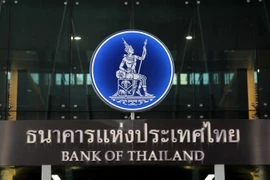Bangkok (VNA) – Thailand's central bank (BoT) has pledged to maintain a strong monetary policy framework amid rising global uncertainty, particularly as new policies are expected to be introduced in the US.
At a monetary forum held by the BoT on January 6, speakers highlighted that US President-elect Donald Trump’s tentative policies, including on taxes and tariffs, trade, energy and immigration, are likely to contribute to increased uncertainty in global financial markets and economies, including China.
These policies may cause inflation to spike in the US and a prolonged period of high US Federal Reserve policy rates, according to the forum.
Such uncertainty may have both positive and negative effects on the Thai economy. For example, Thailand's exports to China could decelerate, and the country may face heightened competition due to an influx of Chinese goods.
Thailand may benefit from a movement of production bases into the country, although this could be tempered by slower investment due to rising global economic uncertainty, noted the forum.
If China's economy slows because of trade conflict with the US, Thailand's export and tourism sectors could also be affected.
Economists urged the Monetary Policy Committee (MPC) to closely monitor Trump’s policy developments.
Last month, the MPC kept its policy rate at 2.25% to support the economy. The BoT emphasised its flexible monetary stance, ready to adjust as needed. While Thailand’s economy continues to recover, progress remains uneven.
According to a BoT report, the country's household debt-to-GDP ratio was 89% in the third quarter of 2024, easing from 89.6% the previous quarter.
Meanwhile, the Bank for International Settlements suggested the household debt-to-GDP ratio should not exceed 80%, as exceeding this threshold can negatively impact economic growth and domestic consumption in a country./.

See more

Thailand aims to reduce workplace accidents
The "Safety Thailand" vision is to cut severe work-related injuries from 2.13 persons at present to no more than one per 1,000 workers, and fatalities from 5.3 to a maximum of three per 100,000 workers by 2030.

Cambodia intensifies efforts to add ancient temples to UNESCO World Heritage list
Cambodia currently boasts four World Heritage Sites: the Angkor Archaeological Park, the Temple of Preah Vihear, the Sambor Prei Kuk Archaeological Site, and the Koh Ker Temple complex.

Indonesian dialogue stresses intergenerational action for green economic development
Indonesia has reaffirmed its commitment to achieving net-zero emissions by 2060, with environmental sustainability and resilience becoming key pillars in the country's national development vision.

ASEAN, New Zealand set sights on comprehensive strategic partnership
ASEAN, New Zealand set sights on comprehensive strategic partnership

Thailand marks progress in cross-border cyber fraud crackdown
The "3 Cuts" strategy, including cutting electricity, fuel, and internet access to five locations along the Thailand - Myanmar borders where many scam centres are located, led to a significant reduction in call centre activities along key border areas.

Thailand updates search efforts at collapsed building following Myanmar earthquake
As of May 8, Thai authorities had confirmed 89 fatalities, nine injuries, and eight individuals still missing in the State Audit Office (SAO).building collapse following Myanmar earthquake.

Malaysia develops data centres to become technology nation
Addressing an event to launch Data Centre Nexus 2025 on May 8, Liew said that data centres could become the largest off-takers to boost local technologies, helping the country achieve its industrial and energy transition aspirations by adopting a “whole-of-value-chain” investment approach.

Malaysia launches campaign to safeguard water resources
The campaign is built on four key pillars - sustainability, preservation, advocacy, and nurture, encompassing education, stakeholder engagement, and a holistic shift in public behaviour.

Vietnam actively promotes ASEAN integration initiatives
The meeting reviewed the implementation of Initiative for ASEAN Integration (IAI) projects and discussed measures to enhance the effectiveness of IAI Work Plan IV (2021–2025).

Thailand calls for farm price stability
Thai Prime Minister Paetongtarn Shinawatra encouraged the acceleration of the "Thai Select" initiative, which certifies high-quality Thai products to promote exports, particularly to assist Thai restaurants abroad in using quality Thai ingredients, which benefits farmers' incomes.

Singaporean navy to use unmanned mine-hunting ships from 2027
The unmanned systems will be equipped with advanced sensors and secure communication networks, allowing operators to detect and neutralise naval mines from a safe distance.

Indonesia to allow private companies to build EV charging stations
In March, Vietnamese automaker VinFast announced its plan to gradually establish 30,000 to 100,000 public EV charging stations (SPKLU) in various regions of Indonesia, especially Java.

Philippines aims to become 2-trillion-USD economy by 2050
The Philippines’ economic transformation will be driven by initiatives that promote new growth drivers while strengthening existing sectors, with private sector involvement playing a key role, particularly in infrastructure and investments that will deliver lasting impact and shared prosperity.

Photo exhibition marks 50 years of ASEAN–New Zealand dialogue partnership
A photo exhibition commemorating the 50th anniversary of the ASEAN–New Zealand Dialogue Partnership officially opened on May 8 at the ASEAN Secretariat headquarters in Jakarta, Indonesia.

Thailand officially bans e-cigarettes in schools, offices
To prevent further harm to the health of children and adolescents, Thailand has introduced four key measures, including a total ban on vaping in all ministry-run schools and offices nationwide.

Malaysia takes actions to retain talents
Economist Prof Geoffrey Williams from the Malaysia University of Science and Technology held that the main reasons are the lack of job opportunities in Malaysia for high-skilled graduates, poor career development and limited promotion prospects.

Indonesia plans 200,000 ha of new marine conservation areas in 2025
Indonesia will set up 200,000 hectares of new marine conservation areas in 2025. The plan aligns with sustainable marine spatial planning.

Malaysia tightens security ahead of ASEAN Summit
Malaysia assumed the ASEAN Chairmanship from Laos on January 1. This year event is held under the theme of “Inclusion and Sustainability”, reflecting the country’s aspiration to build a united and prosperous ASEAN.

Singapore, EU ink digital trade agreement
The agreement supplements the EU-Singapore Free Trade Agreement (EUSFTA) that entered into force in 2019.

Indonesia faces challenge of boosting labour productivity
The nation is also grappling with several structural barriers that hamper productivity growth.







